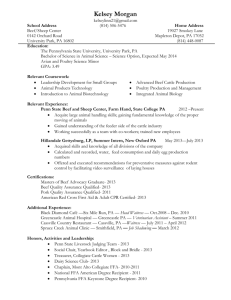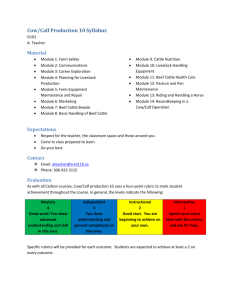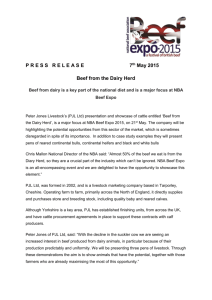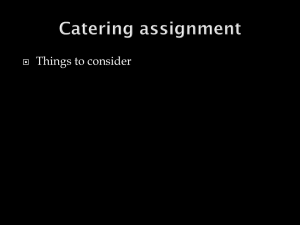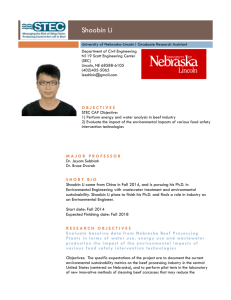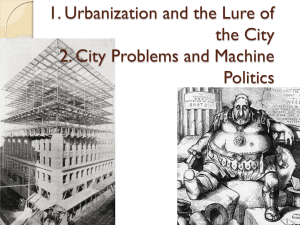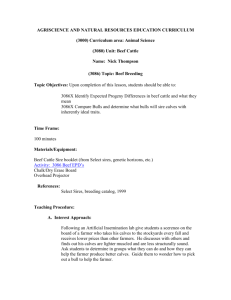Tel: 01644 470206 - Longhorn Cattle Society
advertisement
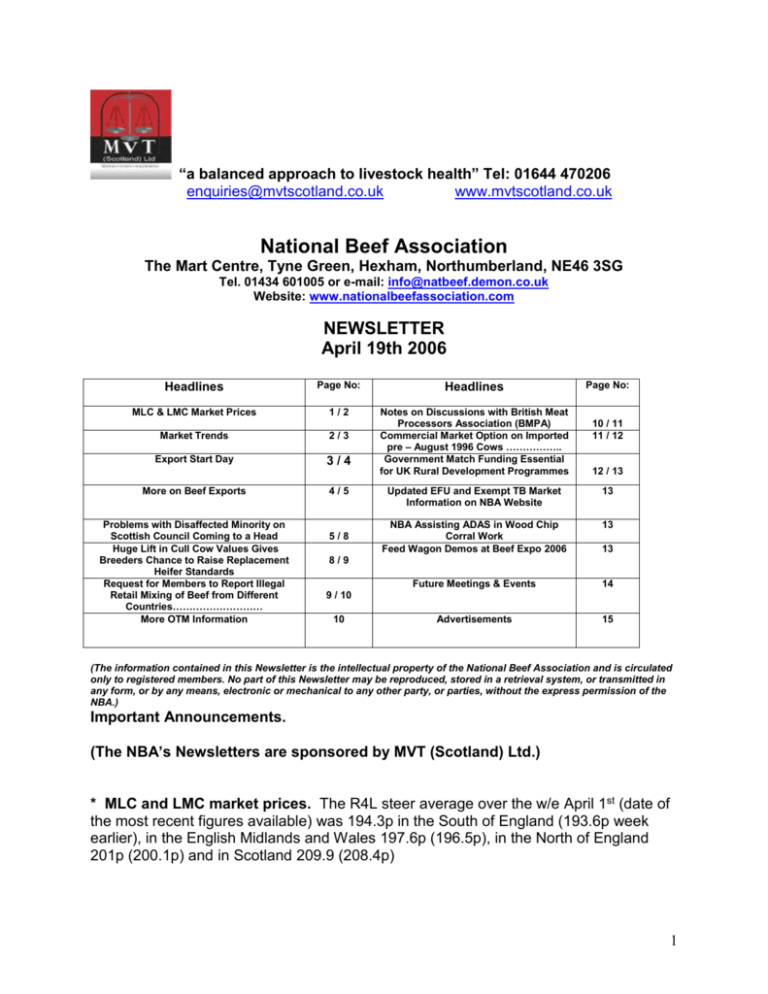
“a balanced approach to livestock health” Tel: 01644 470206 enquiries@mvtscotland.co.uk www.mvtscotland.co.uk National Beef Association The Mart Centre, Tyne Green, Hexham, Northumberland, NE46 3SG Tel. 01434 601005 or e-mail: info@natbeef.demon.co.uk Website: www.nationalbeefassociation.com NEWSLETTER April 19th 2006 Headlines Page No: Headlines MLC & LMC Market Prices 1/2 Market Trends 2/3 Export Start Day 3/4 Notes on Discussions with British Meat Processors Association (BMPA) Commercial Market Option on Imported pre – August 1996 Cows …………….. Government Match Funding Essential for UK Rural Development Programmes More on Beef Exports Problems with Disaffected Minority on Scottish Council Coming to a Head Huge Lift in Cull Cow Values Gives Breeders Chance to Raise Replacement Heifer Standards Request for Members to Report Illegal Retail Mixing of Beef from Different Countries……………………… More OTM Information 4/5 5/8 Page No: 10 / 11 11 / 12 12 / 13 Updated EFU and Exempt TB Market Information on NBA Website 13 NBA Assisting ADAS in Wood Chip Corral Work Feed Wagon Demos at Beef Expo 2006 13 Future Meetings & Events 14 Advertisements 15 13 8/9 9 / 10 10 (The information contained in this Newsletter is the intellectual property of the National Beef Association and is circulated only to registered members. No part of this Newsletter may be reproduced, stored in a retrieval system, or transmitted in any form, or by any means, electronic or mechanical to any other party, or parties, without the express permission of the NBA.) Important Announcements. (The NBA’s Newsletters are sponsored by MVT (Scotland) Ltd.) * MLC and LMC market prices. The R4L steer average over the w/e April 1st (date of the most recent figures available) was 194.3p in the South of England (193.6p week earlier), in the English Midlands and Wales 197.6p (196.5p), in the North of England 201p (200.1p) and in Scotland 209.9 (208.4p) 1 Over w/e April 8th (the latest figures available) the R4 steer average in Northern Ireland was 191.9p (190.9p a week earlier) and in the Republic of Ireland 2-1.4p (197.1p) sterling equivalent. Current deadweight averages for prime cattle in across Great Britain are still just 0.6 per cent higher than this time last year. The O3 cow average in Britain (England, Scotland and Wales) for w/e April 8 th was 134.5 (150.8p a week earlier) in Northern Ireland it was 144.7p (132.6p) and in the Republic of Ireland 171.4p (166.6p) O4 cow averages were 136.8p (140.6p) in Britain, 152.3p (140.9p) in Northern Ireland and 173.4p (168.3p) in the Republic of Ireland. The P2 sequence was 102.8p (104.5p), 111.7p (106.2p) and 136p (131.9p). The P3 sequence was 118.7p (111.4p), 134.3p (129.3p) and 165.3p (156.4p). Feeders should note that slaughter charges and dressing levels before the carcases are weighed for payment vary considerably between different abattoirs. In a meeting with the Rural Payment Agencies abattoir inspectors the NBA was told that at least two English abattoirs are dressing to company specification. Others are dressing to New EU because an approved cow dressing specification has still to be installed. These means there are wide differences in the amount of tissue removed before cow carcases are weighed for payment. It is therefore important for farmers selling deadweight to compare offtakes and trim levels before assessing the real worth of the pence per kilo payment on the kill sheet. The all-cattle auction average in England and Wales for w/e April 1st (latest available figures) was 108.92p (+ 0.38p) and in Scotland 119.92p (+0.44p). Dairy sired cull cows put through English markets averaged 62.07p (+0.17p) and beef sired cows 74.91p (+4.61p). In Scotland dairy sired cows averaged 56.21p (-4.77p) and beef sired 79.73p ((-0.2p). The number of cows sold through auction remains relatively small. Holstein bull calves averaged £21.62 (£14.02) * Market trends. The dominant feature behind the steadily increasing strength of the domestic market is the rising price in the Republic of Ireland. Currently at 201p per dwkg for R4 steers and heifers, which is the same as Northern England, this reflects the growing ability of Irish traders to sell more beef into higher priced EU markets now that the EU is experiencing a steadily increasing supply deficit. In the very recent past high volume sales to Russia (which paid in pennies not pounds) and even subsidy supported sales outside the EU were the foundation for the Irish cattle market and Irish cattle averages were 10p-20p (dw) below our own. 2 However increased demand from short supplied, and high priced, markets in France, Italy and the Netherlands has resulted in significantly higher prices for Irish traders who are now less keen to sell beef at discounts into the UK. These developments sit well with the opening of the EU export market for UK beef on May 3rd. Look out for an immediate lift in the value of prime cattle and cows in Northern Ireland as cattle cross the border into the Republic for companies already supplying established EU markets and buyers in Northern Ireland, who wish to re-establish their own export sales, begin to compete for cattle on offer. British cattle are already being bought in anticipation of the re-opening of export sales and this is driving prices forward. Over the first three months of 2006 some 11 per cent more cattle were killed than in the same period of 2005 – and prices still held up as a result of stronger demand. Cash flow problems, especially in England, are continuing to encourage cattle onto the market as soon as it is sensible to sell them. However tighter supplies are expected at some stage this summer – which together with continuing strong home demand and sales of the first UK beef onto higher priced EU markets since March 1996 - should combine to lift prices further. Prices for cull cows continue to harden too. Slaughterers have asked the NBA to point out that there is no advantage in holding cows back from the market if they all arrive at once later this summer and flood the market. This is undoubtedly but we feel certain that few finishers/feeders are holding back large numbers of cows, especially as SFP hold ups are encouraging farmers to cash cows rather than keep them. Current, unexpectedly low cow slaughterings, (around 7,000 a week) are in part the result of 1,500 cows a week being offered as fallen stock due to the recent change in EU hygiene rules and the receipt of diseased and injured animals into the food chain. One result of this is that the MLC has lowered its forecast of cows entering the food chain over 2006 by 80,000 head. * Export start day Defra has confirmed that beef exports, including pedigree and commercial cattle, from the UK to other EU countries will begin on Wednesday May 3rd 2006 (see above) after a notice has been published in the Official Journal of the European Commission on April 29th. Beef from cattle born before August 1st 1996 and from cattle slaughtered before June 2005 cannot be exported. Only live cattle born after July 1996 can be exported. 3 Confirmation of Wednesday May 3rd as the start date gives the UK beef industry a target to work to. Some slaughter cattle have already been purchased by traders with export customers and more are will be bought this week. This important development, perhaps the most crucial event shaping the industry’s future since exports were banned ten years ago, means that supermarket buyers, who since March 20th 1996 have dominated domestic price structures, will at last face serious competition from traders selling beef into high priced EU markets. As a result the value of slaughter cattle in the UK can be expected to rise as more beef from both prime animals and commercial cows is sold overseas and the grip the multiple retailers have had on slaughter cattle values begins to slacken. Live exports to all EU countries (including France) can take place from May 3 rd if there are orders to fill. This includes store cattle as well as young calves. However beef exports to France (including cow beef) will have to wait until French legislation banning the import of UK beef is repealed. This process begins on April 24 th when the French FSA (AFFSA) will recommend that UK beef can be sold in France and the French government can set the repeal process in motion. This may take only days and it not expected to take weeks. After the process is completed the EU market will be completely open. * More on beef exports. (Text of a briefing note sent on request to Lord Bach, the Minister in charge of the UK position on beef exports.) “The principal benefit will to introduce market competition which has not been faced by UK supermarkets since February 1996. EU prime cattle prices are 10-15 per cent higher than those in the UK and domestic prime cattle prices should have moved significantly closer to these by the end of the summer. Even though France may not be able to enter the carcase beef market until after May 3rd the NBA expects export quality UK cull cow prices (currently around 135p deadweight) to reach those enjoyed in the Republic of Ireland (currently 170p) by the end of May. This compares with the 87p they would have earned under the OTMS before November 7th last year. Our trade contacts say there is an unexpectedly high level of interest for prime beef from potential EU importers. This probably reflects the beef supply deficit within the EU and suggests that unless domestic supermarkets show more interest in paying more for home produced beef much of it will be used to fill supply gaps elsewhere in the EU instead. There is obvious EU interest in live commercial cattle purchases too. This suggests that weaned suckled calves (8-10 month old animals) will be purchased by feeders in Spain 4 and Italy as well as very young dairy bred bull calves for mainly veal finishing in France, the Netherlands, Belgium and Germany. It is worth noting that so far this year 17,000 weaned suckled calves have been exported from the Republic of Ireland and some 36,000 young calves. This gives an indication of the scale that can be expected from the UK – especially through the Northern Ireland land border. The NBA supports live sales to other member countries within the EU single market because it will tie the UK industry more closely with the higher prices paid for beef animals elsewhere in the Union. We expect live sales to raise the value of every beef animal in the UK – which means that more beef farmers will be likely to survive. We are somewhat perturbed that the export conditions for very young calves have still not been agreed or that it may be difficult for export purchasers to buy suitable calves from auction and transport them directly to their new finishing unit. We will be discussing this with Defra officials on April 20th and will be hoping that the conditions are more flexible than they appear to be at present.” * Problems with disaffected minority on Scottish Council coming to head. The year long argument aimed at the NBA by a small group of misguided office holders on the Scottish Council is moving close to resolution. Last week the Scottish Council issued the following ultimatum. Proposal from Scottish Council. (verbatim) At a meeting of the Scottish Regional Committee of the NBA, held at Perth Market on 6th April, the Committee have unanimously agreed to submit a proposal to the Board of Directors of the NBA for consideration, as follows: The Scottish Regional Committee insists on NBA board representation of not less than 3 members of our choosing on the NBA board, which would not exceed 11 board members. The 3 members from Scotland shall represent different Geographic Regions. The board will, together with its 3 Scottish members, urgently review the financial situation with a view to setting a Budget for 2006 that breaks even on actual known income. If this proposal is not acceptable to the board, then the Scottish Regional Committee will have no option but to recommend to our membership that we form our own organisation to represent the interests of the Scottish Beef Industry. It has been respectfully asked that the Board communicate their acceptance or otherwise of this proposal by 5pm, Monday 17th April, 2006. Reply from NBA Chairman, Duff Burrell on 13th April 2006. 5 The directors have looked at and discussed the proposal agreed by the Scottish Council of the NBA on 6th April and sent for their consideration on 9th April 2006. The directors were disappointed not see the minutes of the meeting so that they could clearly follow the discussion that produced the proposal. The Association adopted new Memorandum and Articles on 15 February 2006 limiting the Board to a membership of 12. The directors cannot guarantee that another EGM will vote in favour of changing the board to 11 members. The proposal would leave at least one region without a director. The reason for Scotland to have 3 directors and at least one region to be without would need to be carefully formulated or the association would breach EU law by favouring one region. The Association, in common with many businesses, has very little if any known income. It can only assume receipt of carefully estimated funds through membership subscriptions, the Beef Event, warranties etc. The Board does not wish to reduce the Association’s work output by reducing staff levels; its policy is to maintain present staffing levels so that work is done for the membership and staff may bring in income. The Board have offered a co-opted place on the board to one Scottish member in the last 10 months. This was turned down by the Chairman of the Scottish Council. The Council was invited to nominate another director in the autumn but has not done so. The board would seriously consider a nomination from the Scottish Council and would look favourably on someone who was willing to work for the good of the association but have no room for people who are not willing to work for it. The directors from the other regions have voted unanimously to reject the proposal. The Board assumes that those members of the Scottish Council who wish to form their own Scottish Organisation will have the honour and decency to immediately resign from the National Beef Association’s Scottish Council as they are not pursuing the aims or interests of the National Association. Comment from the Chairman. The directors have seriously considered the proposal from Scotland. The Association is a UK-wide organisation with a UK-wide constitution and remains so. It cannot accommodate the aspirations and ambitions of individuals in pursuit of their own objectives and egos. Members of the Association who are resident in Scotland and wish to continue with the National Beef Association should sit tight and renew their subscription when it is due. I am confident that no other farmers’ organisation offers better value for money for a subscription of just £50 a year. The NBA board will welcome a director from Scotland as soon as the Council is reformed and the region has a nomination. The board is not abandoning Scotland it is 6 merely looking for people who support the Association and is looking forward to working with them. The reality of the NBA’s finances are that over 2005 it was able to continue to pursue its very obvious wide range of policy activities which are exclusively aimed at helping its members move towards much needed profit and at the same time set in train a number of one-off moves that will make the Association even more secure in future. Among the latter are financing the office move from Malvern in Worcestershire to the more central location of Hexham in Northumberland, meeting the legal costs necessary to submit a successful application for Charitable status, paying additional accountancy bills for special audit work demanded by the Scottish Council and setting up a new computer system to simplify financial control. This was an achievement that required the use of the financial reserves and as a result of these long term investments, and new income initiatives that are already underway, the Board expects the NBA to earn more than it spends over 2006 and end the year in a comfortable position. Members will be made aware of this when the 2005 accounts are distributed before the AGM on May 24th and they will be able to see for themselves exactly what has happened and just how off-target the year long accusations of mismanagement by officeholders in the Scottish Council really are. The principal role of the NBA is to serve its members and help them generate profit. The Board is confident the Association has more than fulfilled this function over 2005 and again in 2006. Dissidents, currently within the NBA but who should now resign, cannot use NBA members or NBA funds, to kick start the new organisation they have so often threatened the Association with. They will have to start their self-elected project from scratch. The NBA expects this issue to be fully resolved either before, or at, the AGM in Hexham on May 24th. It is confident it has majority support from its Scottish membership. * Huge lift in cull cow values gives breeders chance raise replacement heifer standards. Beef cow averages of 75p-80p at live auction and 135p-145p deadweight are expected to rise by a further 10-15 per cent within weeks of beef exports opening on May 3rd. This gives suckled calf breeders a first class opportunity to pull out the poorly bred and sub-fertile older cows they preferred to keep when the OTMS set a maximum of only 87p per dwkg for rejects and replace them with a much better group of breeding heifers. 7 The NBA is delighted with the strength of demand for manufacturing beef animals and encouraged by the opportunities this offers to raise both the quality and performance of the national beef herd. As a result it feels that the desire to hold onto badly bred and poorly performing cows just because they can produce a calf every 15-18 months is already weakening now that anything that is reasonably fleshed can be cashed for around £500 and those that are heavier are already making even more. And if, as expected, the O3-04 deadweight averages quickly rises towards the end of May or early June to the 170p deadweight currently recorded in the Republic of Ireland then the reasons to hold onto poorer quality breeders will be further undermined. The Association is certain suckled calf breeders across the UK have their best chance for ten years to upgrade cow standards and establish long term replacement heifer purchasing policies aimed at not just raising management efficiency but also lifting income. Better quality bulling heifers are now within the price range of more farmers because culls are at last earning more money. This gives breeders the opportunity to establish more consistent cow herds able to produce even batches of similarly bred calves and also to attack performance losses caused by poor fertility and stretched calving periods. We expect this to encourage more farmers to specialize in breeding replacement heifers and for more of these to be purchased at 12-14 months, weighing around 400 kilos, to calve down at two years old which would reduce replacement costs because the heifer would earn income more quickly by calving a year earlier. At a national level it is pleasing to see that there is at last no financial obstruction to taking off the bottom 25 per cent of the suckler herd and replacing it with better animals with higher EBV’s and better all-round genetic ability than their poor performing predecessors. And if six-seven year old cows are the most valuable on the manufacturing beef market it should be possible to work this into the system so that relatively young cows are sold to export buyers for more than it costs to buy an even better replacement which can itself be turned over profitably after calving down at two years old and producing three or four calves. * Request for members to report illegal retail mixing of beef from different countries of origin to local Trading Standards Office. Today (April 18th) the NBA told the agricultural and food press that the mixing of beef from different countries of origin in retail chill cabinet displays is illegal – and it is urging you, its members, to report transgressions to your local Trading Standards Office. 8 For some time the Association has been alarmed at the number of occasions in which UK beef has been sold from the same section of the chill cabinet as imported beef and believes many consumers will have picked up packs assuming them to be British when in fact they were not. Last week we wrote to the major supermarkets pointing out that under Article 16 (Regulation (EC) No. 178/2002 of the European Parliament and of the Council it is illegal to mislead consumers in the way packages are displayed and the setting in which they are arranged. It is important to note that EU law supercedes UK law, even in matters relating to beef labeling and retail presentation, and that the multiples are therefore obliged not to mix, or co-mingle, retail packs from different countries of origin.” Members should report any mixing of packs of UK beef, be it Scottish, Welsh, English or from Northern Ireland, with Irish, Brazilian, Australian or Argentine imports to the local Trading Standards Office. Other beef farmers are invited to do the same and quote the relevant EU regulation (see end of this text). The NBA is sure there is an obvious advantage to the UK industry (and it members) if UK beef is sold in a different section of the chill cabinet display to imports. This is because it will allow consumers to be sure they are buying beef produced in the country of their choice - and because UK beef is attractive to purchasers who are more likely to pay a premium it offers an opportunity for the retailer, as well as the farmer, to build up income through increased sales of a higher net margin product or from improved market prices as a result of supplying a higher value animal. Unfortunately there are still occasions in some stores when beef is mixed and comingled and this gives beef farmers a legitimate reason to complain to Trading Standards that they, and other consumers, have been misled. This is because consumers who pick up a pack from a mixed origin section of the chill cabinet, and are subsequently unhappy because they have mistakenly purchased imported beef instead of home produced, can consider themselves to have been deceived by the co-mingling arrangement. The legal text supporting the NBA’s position is as follows. "Article 16 (Regulation (EC) No 178/2002 of the European Parliament and of the Council) Presentation: Without prejudice to more specific provisions of food law, the labelling, advertising and presentation of food or feed, including their shape, appearance or packaging, the packaging materials used, the manner in which they are arranged and 9 the setting in which they are displayed, and the information which is made available about them through whatever medium, shall not mislead consumers. The Association hopes its members will help to establish yet more distance between home produced and imported beef. Members with queries should contact Robert Forster on 01830 520 131. * More OTM information. Some 45 plants in Britain and eight in Northern Ireland have been approved to slaughter OTM cattle born after July 1996. Unfortunately more cattle born before August 1996 are still being delivered, illegally, to approved OTM centres. These cattle are being confiscated and their owners could be charged with a criminal offence. Many transgressions cover cattle born in 1996 but before August. Vendors must be more aware of this distinction otherwise more farmers will lose money and UK credibility over its ability to work within the EC’s anti-BSE regulations will be undermined – with possible repercussions on export deliveries. Defra is examining the operation of the OCDS. It is currently attracting a throughput of just 2,200 cows a week which is not enough to keep the ten OCDS plants in economic operation. * Notes on discussions with British Meat Processors Association (BMPA). Processors are looking forward to the opening of export markets (now known to be on May 3rd). The development of new trade in tongue, tail, thick skirt, hearts and cheekmeat (now that UK SRMs are to be harmonised with the rest of the EU) is expected to raise carcase values by 5p per dwkg, or around £15 per head, once sales volumes are established. This important facet of the beef market is often overlooked with farmer and media attention more often attracted by the potential for sales of higher priced retail and restaurant cuts. However the benefits of this will be undermined by Defra’s unfortunate interpretation of the Waste Incineration Directive (WID) which means once valuable tallow can no longer be used in rendering plants as fuel. This could result in a £30 a tonne lifting charge for tallow which would add substantially to the industry’s bill for bi-product disposal and could lift slaughter costs by £6-£10 per beef carcase or 2p-3p per kilo. It was noted that despite its green credentials Defra, unlike governments in the Republic of Ireland and other EU countries, was not prepared to view tallow as a product that could be used as a natural fuel but had identified it was waste. Renderers and processors were looking at ways of persuading Defra to change its mind. The NBA has already made its feelings clear to Mrs Beckett on this issue but 10 indicated its willingness to take a lead from UKRA and BMPA on how to assist the industry’s challenge and would wait for advice on the best way to do this. BMPA also voiced concerns that there could be a repeat last summer’s oversupply induced prime cattle price drop, which undermined producer confidence at a time when the maintenance of positive attitudes was vital, unless more effort is made now to even supplies of both cows and prime cattle to prevent the July-August market becoming choked. * Commercial market option on imported pre-August 1996 cows only possible if import date verified. The Food Standards Agency (FSA) has confirmed that the most important information on these animals is the import date rather than the date of birth. While imported pre-August 1996 cattle are allowed to be sold commercially into the food chain this will not be possible unless the import date can be confirmed on the passport or any other official document. Because such animals without a confirmed import date cannot enter the OCDS they would have to be collected free of charge by Defra through the Fallen Stock Scheme. This means that the owners of pre-August 1996 imported animals with no verified import date members will lose the value of the animal itself but incur no additional disposal costs. * Government match funding essential for UK Rural Development Programmes (RDP). Last week the NBA informed more farmers, and their representatives, of the dangers of a shortfall between RDP funding and RDP ambitions as its members in all UK countries are asked by their government to contribute ideas on the best way to construct a Rural Development Programme (RDP) for 2007 and beyond. We are continuing to press the argument that UK farmers will have to accept that from January next year around 12 per cent of their Single Farm Payment (SFP) will be deducted through voluntary modulation to fund the RDP – assuming that match funding for a ground level, farm based, environmental enhancement plan from the National Exchequer is confirmed, as expected, in June. However if there is no help from Gordon Brown then the RDP could cost farmers 20 per cent of their much needed SFP unless non-farmer stakeholders, and regional governments accept this is too much to take from a hard pressed industry and are prepared to cut back their RDP ambitions by the 40 per cent necessary to bring the modulation contribution from farmers back to 12 per cent. The NBA is among those hoping that the Chancellor’s much talked about contribution will be approved and that RDP plans currently under construction, and which assume some match funding, can go ahead – not least because they offer participating stock 11 farmers an opportunity to recover a chunk of their modulation offtake in exchange for a commitment to environmental enhancement. But if match funding for RDP is blocked because the money is required elsewhere the NBA would like a Plan B that takes this unfortunate development into account to become an integral part of the current RDP consultation otherwise the ability of thousands of farms to survive decoupling will be dramatically undermined by the overkill of a 20 per cent deduction from SFP. Plan B would require agreement by all RDP stakeholders on a revised project list that takes account of the Chancellor’s missing £millions and prioritises only the programmes most essential elements. From the NBA’s perspective these must include the successor to HFA support schemes and continuation of the base level principles laid down for environmental enhancement at farm level. Unfortunately this would mean that some ideas already put forward by non-farmer stakeholder groups for a match funding assisted Plan A would have to be suspended or shelved and we hope they soon understand why, should government match funding not be forthcoming, this has to be the case. Updated EFU and exempt TB market information on NBA website. Full details of the recently approved requirements for Exempt Finishing Units (EFUs) and Exempt markets (EMs) can be found on the NBA website www.nationalbeefassociation.com . Members who finish cattle bought from 1-2 year TB testing parishes are urged to examine these closely and see whether they can set up an EFU within their current operation. * NBA assisting ADAS in wood chip corral work. ADAS specialists examining the advantages of establish woodchip corrals have asked the NBA to assist in finding sponsors for a research programme that will allow advisors to pass on for information on the best way to build a corral and deal with is waste products. This progress, if successful, will help to overcome possible objections from local authorities and allow more to be constructed. * Feed wagon demos at Beef Expo 2006. A continuous working demonstration of Total Mixed Ration (TMR) diet feeders and straw choppers will be a feature of the UK’s national beef event, Beef Expo 2006, at Borderway Mart, Carlisle, on Friday, June 2 which is organised by the NBA. A total of eight machines will be demonstrated at 20-minute intervals throughout the day mixing baled silage, straw and a protein supplement. 12 The demonstration will give visiting farmers a unique opportunity to assess these feeder wagons in real practical conditions rather than simply sitting on a stand as at most shows. This is the highest number of machines the NBA has been able to organise for a demonstration at the Beef Event and indicates the growing interest among beef farmers in TMR feeding. The following machines will be demonstrated – Keenan Klassic 170 Bale Chopper (Richard Keenan); Hi-Spec Vertical Auger Feeder (Hi-Spec Engineering); Kuhn 1460 Diet Feeder (Kuhn Farm Machinery); Sgaribold’i Diet Feeder (Lely UK); Lucas Castormix 111 RUC (Lucas France); Shelbourne Powermix 11 Diet Feeder (Shelbourne Reynolds); Teagle Tomahawk 8080TC (Teagle Machinery); and JF-Stoll VM Series (Westmac). Beef Expo 2006 is expected to attract several thousand beef producers from all over the UK and Ireland as well as visitors from overseas. The annual event is organised by the National Beef Association. Mainline sponsors this year are Harrison and Hetherington Ltd, who are hosting the event at Borderway Mart, Dugdale Nutrition, EBLEX, Intervet, Keenan and Yara. Other features of Beef Expo 2006 will include a new National Suckled Calf Show, educational exhibits, beef breed displays, stockjudging, seminars and trade stands, with the emphasis on performance, health, efficiency of production, profitability and marketing. All members, and their neighbours/friends, should mark the date and make sure they are able to attend. On the day before the event, Thursday, June 1, there is an opportunity to visit three Cumbrian beef farmers followed by a major beef conference and pre-event dinner. (ee previous Newsletters.) Future Meetings. Tuesday April 25th South West annual meeting. Fingle Glen Golf Club, Tedburn St Mary, near Exeter at 7.30pm. Speakers include Gilly Greed and John Hoskins. Thursday May 4th Markets Intelligence Committee meets Farmers Club London at 1.30pm. Wednesday May 10th Policy Development Committee meets Farmers Club London at 1pm. Wednesday May 24th NBA annual meeting. 1.00pm Function Suite, 13 Hexham Auction Mart, Tyne Green, Hexham, Northumberland. Guest speakers: Jean-Pierre Garnier, head of export development MLC. Senor Diogo Macedo, beef importer, Portugal. Subject “Export prospects for UK beef industry”. All members are encouraged to attend. Friday June 2nd Beef 2006, Borderway Mart, Carlisle. (From 9am) Thursday July 6th Open Day at Hatchmoor Farm, Hawkley, home of Frank Momber. EBLEX. More details to follow. Sponsored by Beef & Growing Cattle South West 2006 takes place on Thursday 7th September from 9am to 5pm. Adults £7.00, Students £5.00, Children up to 16 years old £3.00 (Under 5’s free). For further information or to exhibit at the event, contact Rosemary Risdon, Event Co-ordinator, National Beef Association South West on 01409 271238 or email nbasw@tiscali.co.uk Advertisements: 685 Blonde D'Aquitaine 12-18 month old stores born and bred on Gore Cross Farm will be sold at Frome Market on 4th May (4/5/06). There are 43 big steers and 42 heifers aged 18-21 months. The remaining 304 steers and 298 heifers will be 11-13 months old. All are out of big cows, mostly Limousin cross or South Devon cross, and are by very good Blonde D'Aquitaine bulls. All are well grown and are looking excellent. Come and see them at our open day on 27th April and for more details and a catalogue call the Farm Manager, Keith Potter, on 07966 488882 or the Auctioneers, Premier Livestock on 01373 830033. E-Mail Information - Over 1200 e-mailed Newsletters are now being sent out. Please can all those members who have CHANGED their e-mail information, contact the office with any updates, so that our distribution lists can be amended. This will help us to offer a more efficient service to our members. If you are a paid up member of the NBA and are not getting a copy of Newsletters, and you have an e-mail address, please email the information to our Hexham office at info@natbeef.demon.co.uk Advertising with the NBA a) Advertisements will be placed in BOTH the fortnightly newsletter AND our Internet Website. The charge we make will be fully inclusive of website and newsletter ad-placement costs. b) We will charge a fee of £0.20p (Twenty Pence) per Word. Numbers count as words (e.g. 487kg counts as two words, 487 and kg; 0234 887654 counts as two words, etc). c) There is a Minimum Charge of £10.00 for One Month; £15.00 for 2months; £50.00 for 6 months. d) VAT will be added to the charge. e) Advertising can only be done if the Ad. Copy is sent to us by e-mail. We will not accept fax or paper copy. f) We can include pictures on the WEBSITE ONLY, which must be in JPEG format. A maximum of TWO pictures are allowed, at a fixed, 2-monthly cost of £5.00 EACH picture. For example, if you wanted Two pictures for One Month the charge would be £10 plus vat, in addition to the wording charges. If you wanted two pictures for 2 months, the price would be the same. For three months, 2 pictures would be £20.00 plus VAT in addition to the wording charges; for 6 months, 2 pictures, £30 plus VAT in addition to the wording charges. 14 To place an Ad, or any other information (including the NBA Terms & Conditions for use in Private Sales of Pedigree Cattle by Individual Members of the NBA & the Warranty Certificates) please contact Helen Dobson at the New Office : National Beef Association, Mart Centre, Tyne Green, Hexham, Northumberland NE46 3SG or by e-mail to helen@natbeef.demon.co.uk or telephone her on 01434 601005. 15

